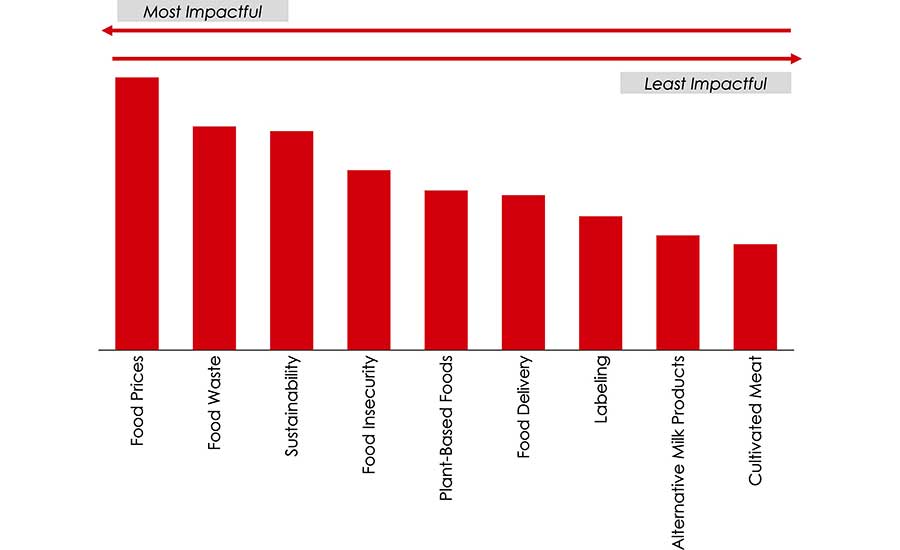Food Safety Insights: Food Safety Priorities—Getting ‘Back to Basics'
Pandemic disruptions prevented a greater focus on fundamental issues, to which processors are now returning

In the last edition of Food Safety Insights, we presented Part 2 of our findings from our survey in April of this year asking you about your top priorities for your food safety program. Last issue, we covered your recovery from COVID-19 and, while most said that they were back to normal, many were still dealing with residual challenges. Let us hope they are continuing to make progress.
In this third and final article of this series, we present the rest of the details of what you told us are the most pressing issues for your food safety programs.
Top Program Priorities
We asked all of the survey respondents, in an open-ended question, to tell us their top priorities for their food safety program in the short-term, which we defined as the next 12–24 months.
The two top responses (Figure 1), coming in at 20 percent of total responses each, were food safety culture and microbiological control (including environmental monitoring). In the third spot was another fundamental issue closely related to the first two—sanitation and hygiene.
In the comments, what we heard is that these concerns are what we would characterize as a focus on maintenance and improvements of food safety fundamentals. We have seen these comments before in previous Food Safety Insights columns published during the pandemic. The disruptions that affected processors' business prevented a greater focus on fundamental issues such as food safety culture, environmental monitoring, sanitation, employee training, and audit compliance.
To be clear, this is not to say that such fundamental responsibilities were ignored or overlooked, and very few reported that they had let these issues slip or become a serious deficiency. Many, however, reported that they were unable to make any advancements or improvements in their programs while dealing with pandemic-related issues. Respondents mentioned, for example, that they have outdated documents to update and overdue training to implement. Others mentioned that they were able to stay current on their present certifications, but they have not been able to add any new modules to existing certifications or add any new certifications to enable them to expand their business, and it is time to get back to those efforts. In other words, we are seeing a "back to basics" emphasis, with a better focus on continuing improvement now being possible again.
Regulatory compliance also ranked high on the list of priorities, and we wanted to hear which ones you saw as having the most near-term impact. As can be seen in Figure 2, supply chain regulatory/certification compliance ranked high on the list, with Food Safety Modernization Act (FSMA) Rule 204 traceability requirements as the most cited priority, and FSMA and Food Safety System Certification (FSSC) 22000 Version 6 ranking second and third priority. While FSMA and FSSC Version 6 certainly address more than supply chain issues, what is not evident from Figure 2 is what we heard from you. Survey respondents indicated that the most frequent concerns for compliance with FSMA and FSSC Version 6 are the Foreign Supplier Verification Program (FSVP) requirements and the supply chain management controls incorporated through the inclusion of ISO 22000, respectively. FSMA and FSSC Version 6, together with FSMA 204, make supply chain compliance the most impactful requirement cited by processors. This will likely remain the case for the next few years through the 2025/2026 compliance dates.
Looking for quick answers on food safety topics?
Try Ask FSM, our new smart AI search tool.
Ask FSM →
Thoughts on Regulations and Requirements
Other than these "basics," what else should be focused on, and what might be unnecessary? In our survey, we also asked a pair of what some may consider to be "provocative" questions:
- In your opinion, what regulation or requirement is generally most needed to improve food safety?
- In your opinion, what current regulation or requirement is least needed or has the least positive impact on food safety?
For the first question, and in line with the priorities we have already heard about, the most common responses involved hygiene, sanitation, and environmental monitoring programs. Many people cited the effectiveness of a sound cleaning and sanitation program, combined with employee hygiene, as being the most impactful contributors to food safety. A few respondents shared recommendations for process improvements that would advance plant sanitation, but most said that better training, oversight, and compliance with current procedures would produce more benefits than new regulations or requirements.
Several respondents mentioned that a certified/licensed food safety manager acting as the responsible person in charge should be onsite at all times during production. Several people thought that this does not necessarily have to be a new regulation or licensing requirement, but should be part of any responsible company's food safety culture. Others cited specific steps that should be improved to achieve better execution and control of hygiene, cleaning, and sanitation programs, including more inspections, better validated environmental and pathogen swabbing practices, the use of quantitative analysis for environmental pathogens, improved water control and treatment, and, underpinning all of these suggestions, better and more frequent training. Several added a wish for consolidation of regulatory and certification requirements—many of which they saw as redundant.
For question two, many seemed to be satisfied with the current intensity of food safety regulations, as many said that the regulations and requirements are necessary and useful. Perhaps these individuals were being diplomatic, however, as many of their colleagues had several examples to offer of ineffective or unnecessary requirements. Many mentioned that we should work to eliminate useless records and documentation that are collected simply for the sake of "documentation" but not used to track progress on process improvements. One general manager said, "…documentation should evolve to create KPIs or uncover tendencies," suggesting that documentation is otherwise just recordkeeping for the sake of recordkeeping.
Others suggested that consolidation of inspections and audits, especially when considering that they can come from regulatory agencies, multiple certification bodies, and major customers, can be time-consuming and redundant. One food safety specialist pointed out, "The consistent auditing is beginning to consume so much time that it's interfering with the time needed to actually run a food safety program effectively… the third-party audit annually is thorough… In my opinion, [major customers] should just actually read the third-party audit, and if they have any issues from that, they can request more information. Just my opinion. I think they are wasting our time, but you can't say no to the customers."
Like business issues, consumer issues can also significantly affect our business. Just as the food safety specialist above said that you cannot say no to customers, you would be well-advised not to say 'no' to your end-consumers, as well. The best companies stay ahead of and responsive to their end-consumers.
Perspectives on Consumer Issues
We also asked for your opinions on the direction you see consumer attitudes taking. In our survey, we ranked nine different consumer issues, in order of level of impact on our industry.
By a wide margin and receiving by far the most top rankings, respondents cited food pricing as the key concern (Figure 3). Many of the respondents also added that food pricing concerns go hand-in-hand with availability, recognizing scarcity as a major factor in food pricing and inflation. Being able to buy the food they need, at a price they can afford, is certainly a factor that will drive the behavior of consumers, including the choices they make, the alternatives they look for (and may switch to permanently), and the impact of packaging on the perception of price.

These factors are also closely related to what respondents ranked as the fourth-most impactful issue—food insecurity. Controlling inflation and having sufficient food available at an affordable price for all income levels should be a key concern for everyone in our business.
Two other prominent concerns were food waste and sustainability. From the comments we received, these concerns are linked, and refer mainly to the waste of food—both from a producer and consumer perspective—in an environment of shortages and concerns about packaging and supply chain stability. To be sure, some of the concern is also linked to the impending FSSC 22000/ISO 22000 certification requirements for processors that we mentioned earlier. To add some additional perspective on these opinions, we also asked an open-ended question for suggestions of other consumer issues not listed. The top responses included "best by" dating, shelf-life studies, and clarification on when food is or is not safe to keep and consume, bringing this back to consumer behavior.
Thank You for Your Feedback!
This three-part series on food safety priorities, based on your survey responses, has been illuminating for those of us at Food Safety Insights and Food Safety Magazine, and we have enjoyed bringing it to you. Hearing the latest thinking about everything from the reorganization of the U.S. Food and Drug Administration to the recovery from the pandemic, and the related issues affecting processors' thinking and priorities, is why we created Food Safety Insights in the first place. Understanding these opinions, and their potential to drive the industry, is important for everyone in food safety—regulators, processors, and service providers alike—to understand.
We look forward to bringing you our next rounds of insights in the December/January issue and in the following years.
Bob Ferguson is President of Strategic Consulting Inc. and can be reached at bobferguson9806@gmail.com or on Twitter at @SCI_Ferguson.








